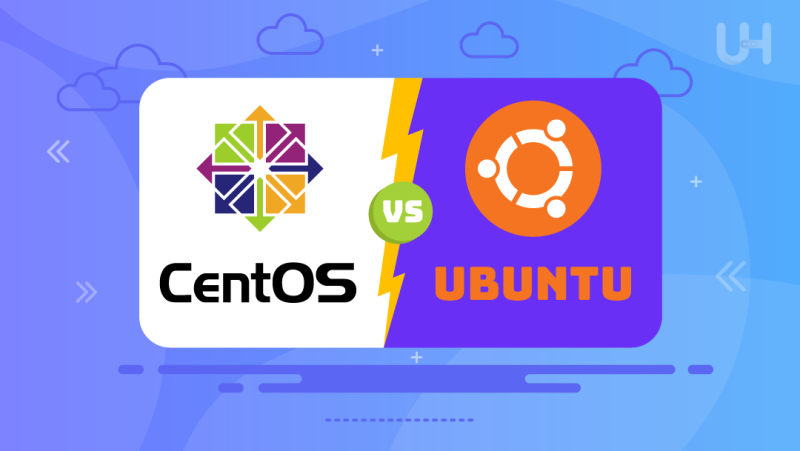CentOS and Ubuntu are two of the most popular Linux distributions used today. Each distribution has unique characteristics and benefits, making them suited to customers with different needs. Which of them is best for you? This CentOS vs Ubuntu showdown is the only guide you’ll need!
Whether you are setting up a server or looking for a reliable desktop OS, in the rest of this piece, we will examine what makes each distribution unique and their pros and cons so you can decide which of the two ticks the most boxes for you.
What Is Ubuntu?
Ubuntu is a prevalent version of Linux derived from Debian. Both Debian and Ubuntu have some similarities and differences, but they both feature a user-friendly interface and extensive community support. Therefore, Ubuntu will be appropriate for all users, from the inexperienced to the most advanced. Ubuntu also comes with a vast variety of software, pre-installed.
It has a regular release cycle: new versions are available every six months, but LTS ones happen every two years and are available for five years each. This balances its newest features against stability. On the other hand, Ubuntu is super versatile, providing infrastructure for both desktops and servers, making this distribution very popular for personal and professional use.
What Is CentOS?
CentOS, short for Community Enterprise Operating System, aims to inspire the creation of additional free Linux distributions based on Red Hat Enterprise Linux sources. It is developed to work in enterprise environments, which offer an operating system with a stable, safe, and reliable platform. One of the critical goals of the CentOS project is to provide an up-to-date and stable computing environment with long-term support and feature updates.
All of these features make CentOS one of the best Linux distributions for businesses and organizations that need enterprise-class operating systems without the related RHEL costs. With a focus on stability rather than bleeding-edge features, CentOS has become very popular in servers, network management, and enterprise-grade applications.
Benefits Of Ubuntu & CentOS
Ubuntu offers manifold benefits: user-friendly, high community support, and regular updates. Easy to use, it is highly suitable for beginners; at the same time, its robust performance makes it perfect for advanced users. It supports many hardware and software options, powers the fastest servers, and other applications. Such a regular release cycle allows users to always have the newest features and safety updates, ensuring the operating system is safe and up-to-date.
Opt For Top-Tier High-Performance Hosting for Ubuntu!
Make the ideal decision to host your site with UltaHost Ubuntu VPS Solution and get ultimate control over the mentioned customization. Keep your servers running fast, stable, and always up!
On the other hand, CentOS is stable, secure, and very enterprise-friendly. Stemming from Red Hat Enterprise Linux, CentOS inherits a rigorous regime of testing and quality assurance to give any enterprise a dependable operating system. CentOS also provides long-term support with updates and data security and data privacy patches supplied for extended periods to reduce overall business costs. Stability over the bleeding edge ensures reliability in this platform for mission-critical apps and services.
Drawbacks Of Ubuntu
While Ubuntu has several advantages, it also has its drawbacks. The high frequency of updates, which keeps the system up-to-date, sometimes introduces instability or could be more resource-intensive for maintenance. Moreover, Ubuntu’s default user interface and settings may not meet users’ tastes or purposes, so further customization may be required. In the enterprise sector, where long-term support is especially desired, these comparatively short life cycles and support periods for non-LTS variants are often perceived as a drawback as they require upgrading at a faster rate.
Drawbacks Of CentOS
While highly stable, CentOS might not be as user-friendly as Ubuntu for game servers. Being oriented to enterprise environments, CentOS often does not offer the newest applications because the idea of stability overrides the quest for cutting-edge features. This is a real drawback for many users who need to use only the newest applications and technologies.
The other major disadvantage, in contrast to Ubuntu, is that CentOS has fewer support options, a less thriving community, fewer online resources, and tutorials, making troubleshooting hard for newbies
Making The Right Choice

The choice between Ubuntu vs CentOS largely depends on the needs and use cases. If you need a user-friendly, versatile operating system with strong community support, Ubuntu may be the right one. It serves best on desktops, development environments, or servers where updates regularly occur.
On the other hand, if you need an enterprise application where stability and data privacy are super important, then CentOS might be the better choice for you as it is perfect for businesses and organizations seeking a secure, low-maintenance platform. Considering your technical requirements, support needs, and the desired update cycle will help you decide between the two Linux distributions.
Future Of Ubuntu
The future for Ubuntu is one of continuous development and innovation, supported by the backing company Canonical. With its regular release cycle, Ubuntu has been at the leading edge of technology, offering users new features, security updates, and improvements. More importantly, it has focused on cloud computing, the Internet of Things, and artificial intelligence to make Ubuntu an all-in-one and forward-looking operating system. This technology has a strong base of community support and wide adaptation across different industries, predisposing itself toward sustained growth and relevance in the tech world.
Future Of CentOS
CentOS itself is evolving, most recently with the addition of CentOS Stream, a rolling-release distribution that very closely mirrors—but with a little offset—the leading edge of RHEL. The intent of this change is closer collaboration between the CentOS community and the RHEL developers toward more frequent updates and a far more dynamic development process.
Although this change alienated some users, CentOS Stream provides a balanced way to get stability and access to more recent software. CentOS remains relevant and appealing to enterprise environments while maintaining its reputation for reliability and long-term support, particularly in contexts like CRM servers, thanks to this adaptation.
Conclusion
The choice between Ubuntu or CentOS is about needs and preferences. Ubuntu sports a user-friendly interface, frequent updates, and tremendous community support that will make it an ideal operating system for beginners, professionals, or even the in-betweens.
CentOS offers unrivaled stability, security, and long-term support, making it very useful in enterprise environments. CentOS is highly compatible and provides robust performance for critical applications and services. You can confidently select the Linux distribution that best meets your needs by rating your usability needs against support and system longevity.
Get powerful Linux hosting that grows with you. On each UltaHost’s Linux Server package, you get root/admin access and can upgrade your resources in one click!
FAQ
How is CentOS different from Ubuntu?
While CentOS is a Red Hat Enterprise Linux clone focusing on stability and long life cycles, Ubuntu is a derivative of Debian with many updates, including a user-friendly GUI for desktop and server purposes.
Which should a beginner use: Ubuntu or CentOS Linux?
Generally, Ubuntu is better for beginners because of its ease of use and significant community support—it updates regularly. CentOS, while stable itself, requires a little more technical expertise to set it up and keep it running.
Can CentOS be used for personal use, or is it enterprise?
Unless you want the latest features, CentOS is suitable for personal use. The most common usage involves enterprise environments, although it can be configured to work well in both personal servers and applications.
What advantages does Ubuntu have over CentOS?
Ubuntu excels at being more straightforward to use, supporting more software, and including updates even faster. People prefer it for its versatility on the desktop and in server environments because a large community backs it.
Is CentOS Stream better for people needing more recent software updates?
CentOS Stream closes the gap between stability and access to more recent software. This can be specifically useful for people needing frequent updates while still wanting to ensure reliability within their Linux distribution.










